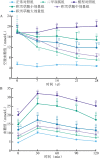Asiatic acid improves insulin secretion of β cells in type 2 diabetes through TNF- α/Mfn2 pathway
- PMID: 37283103
- PMCID: PMC10409975
- DOI: 10.3724/zdxbyxb-2022-0647
Asiatic acid improves insulin secretion of β cells in type 2 diabetes through TNF- α/Mfn2 pathway
Abstract
Objectives: To investigate the effects and molecular mechanisms of asiatic acid on β-cell function in type 2 diabetes mellitus (T2DM).
Methods: The T2DM model was established by high fat diet and streptozotocin injection in ICR mice, and the effects of asiatic acid on glucose regulation were investigated in model mice. The islets were isolated from palmitic acid-treated diabetic mice. ELISA was used to detect the glucose-stimulated insulin secretion, tumor necrosis factor (TNF)-α and interleukin (IL)-6. ATP assay was applied to measure ATP production, and Western blotting was used to detect protein expression of mature β cell marker urocortin (Ucn) 3 and mitofusin (Mfn) 2. The regulatory effects of asiatic acid on glucose-stimulated insulin secretion (GSIS) and Ucn3 expression were also investigated after siRNA interference with Mfn2 or treatment with TNF-α.
Results: Asiatic acid with the dose of 25 mg·kg-1·d-1 had the best glycemic control in T2DM mice and improved the homeostasis model assessment β index. Asiatic acid increased the expression of Mfn2 and Ucn3 protein and improved the GSIS function of diabetic β cells in vitro and in vivo (both P<0.05). Moreover, it improved the ATP production of islets of T2DM mice in vitro (P<0.05). Interfering Mfn2 with siRNA blocked the up-regulation of Ucn3 and GSIS induced by asiatic acid. Asiatic acid inhibited islet TNF-α content and increased Mfn2 and Ucn3 protein expression inhibited by TNF-α.
Conclusions: Asiatic acid improves β cell insulin secretion function in T2DM mice by maintaining the β cell maturity, which may be related to the TNF-α/Mfn2 pathway.
目的: 研究积雪草酸改善2型糖尿病β细胞功能的作用及分子机制。方法: 利用高脂饲料和链脲佐菌素构建2型糖尿病小鼠模型,评估不同浓度积雪草酸对2型糖尿病小鼠血糖调节作用,筛选积雪草酸最佳治疗浓度。体外采用棕榈酸处理小鼠胰岛构建2型糖尿病胰岛模型。针对积雪草酸处理后体内、外胰岛模型,利用酶联免疫吸附试验检测胰岛β细胞葡萄糖刺激的胰岛素分泌(GSIS)功能、胰岛内肿瘤坏死因子(TNF)α、白介素(IL)6含量,紫外分光光度法检测胰岛内腺苷三磷酸(ATP)含量,蛋白质印迹法检测胰岛β细胞成熟标志蛋白尿皮质素(Ucn)3及线粒体融合蛋白(Mfn)2表达变化。采用小干扰RNA干扰Mfn2或加用TNF-α处理胰岛后,考察积雪草酸对Ucn3表达及GSIS功能的调控作用。结果: 体内实验显示,25 mg·kg-1·d-1积雪草酸具有较好的降糖效果,并改善稳态模型评价β细胞指数。积雪草酸可增加Mfn2和Ucn3蛋白表达,改善体内、外糖尿病模型β细胞GSIS功能(均P<0.05)。体外实验显示,积雪草酸可改善2型糖尿病胰岛ATP生成量(P<0.05);干扰Mfn2阻断积雪草酸对Ucn3和GSIS的上调作用。积雪草酸可抑制糖尿病胰岛TNF-α生成(P<0.05),逆转TNF-α所导致的Mfn2及Ucn3蛋白表达下调。结论: 积雪草酸能改善2型糖尿病β细胞胰岛素分泌功能,其机制可能与调控TNF-α/Mfn2通路维持β细胞成熟有关。.
Keywords: Asiatic acid; Glucose stimulated insulin secretion; Inflammatory factor; Mouse; Type 2 diabetes; β cells.
Conflict of interest statement
所有作者均声明不存在利益冲突
The authors declare that there is no conflict of interests
Figures
Similar articles
-
Metallothionein 1 negatively regulates glucose-stimulated insulin secretion and is differentially expressed in conditions of beta cell compensation and failure in mice and humans.Diabetologia. 2019 Dec;62(12):2273-2286. doi: 10.1007/s00125-019-05008-3. Epub 2019 Oct 17. Diabetologia. 2019. PMID: 31624901
-
Natural product vindoline stimulates insulin secretion and efficiently ameliorates glucose homeostasis in diabetic murine models.J Ethnopharmacol. 2013 Oct 28;150(1):285-97. doi: 10.1016/j.jep.2013.08.043. Epub 2013 Sep 5. J Ethnopharmacol. 2013. PMID: 24012527
-
Specific PERK inhibitors enhanced glucose-stimulated insulin secretion in a mouse model of type 2 diabetes.Metabolism. 2019 Aug;97:87-91. doi: 10.1016/j.metabol.2018.12.007. Epub 2019 Jan 4. Metabolism. 2019. PMID: 30615948
-
Urocortin3: Local inducer of somatostatin release and bellwether of beta cell maturity.Peptides. 2022 May;151:170748. doi: 10.1016/j.peptides.2022.170748. Epub 2022 Jan 19. Peptides. 2022. PMID: 35065098 Free PMC article. Review.
-
Amino acid-stimulated insulin secretion: a path forward in type 2 diabetes.Amino Acids. 2023 Dec;55(12):1857-1866. doi: 10.1007/s00726-023-03352-8. Epub 2023 Nov 15. Amino Acids. 2023. PMID: 37966501 Review.
References
-
- 项佳媚, 肖伟, 许利嘉, 等. 积雪草的研究进展[J]. 中国现代中药, 2016, 18(2): 233-238. 10.13313/j.issn.1673-4890.2016.2.025 - DOI
- XIANG Jiamei, XIAO Wei, XU Lijia, et al. . Research progress in Centella asiatica[J]. Modern Chinese Medicine, 2016, 18(2): 233-238. (in Chinese) 10.13313/j.issn.1673-4890.2016.2.025. 10.13313/j.issn.1673-4890.2016.2.025 - DOI - DOI
MeSH terms
Substances
LinkOut - more resources
Full Text Sources
Medical







